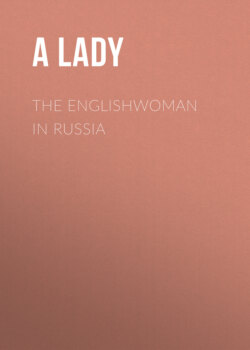Читать книгу The Englishwoman in Russia - A Lady - Страница 3
На сайте Литреса книга снята с продажи.
ОглавлениеPREFACE.
Table of Contents
Without troubling the reader with any account of a sea voyage from England to Archangel, as all travels on the “vasty deep” present pretty much the same features which have been so frequently and so well described by others, I will only observe that circumstances induced me to reside for more than ten years in Russia, which I have only recently quitted.
The following pages contain a simple account of the manners, customs, and genre de vie chez eux of a people whose domestic habits are comparatively but little known to the English nation.
Of the truth of many of the anecdotes I can assure the reader; others I have had from good authority, and I have every reason to believe that they are veracious.
The names of persons that are inserted in the text are not those of Russian families: the Russians, like the ancient Greeks, have a termination denoting parentage; the syllables vitch for the masculine, and ovna for the feminine, are merely equivalent to the classic ides. Thus, Dmitri Ivanovitch, means Demetrius the son of Ivan; Cleopatra Ivanovna, Cleopatra the daughter of Ivan, &c. I have therefore betrayed none, because the surname is omitted; I have also taken the further precaution to change one of the names in every instance, lest my friends should incur any evil consequences from their government, which is at the present time so exceedingly suspicious, that, for the most harmless expression, the offender who made use of it would be liable to be banished to Siberia.
I trust that I have done full justice to all the amiable and social excellences of the Russians. Of their other qualities I beg the reader to form his own judgment. “Une nation de barbares polis,” said a French gentleman, in speaking of them; but one cannot deny that they possess the good qualities of savages, as well as their bad ones. Perhaps the Muscovite character is the most difficult of any to understand; and after living for years in Russia, it is very possible not to know the Russians. They seem indeed to possess two characters, each distinguished by traits diametrically opposed to those of the other. One may be considered as their private, and the other as their public character; and I cannot pretend to the power of defining them. I have seen a Russian colonel, known for his excessive severity, who would witness unmoved the terrible infliction of the knout, perfectly unable to control his tears at the mimic sorrows of a French actress. He that is mean and despicable in public life, is often kind, amiable, and liberal at home. He who would be merciless and oppressive to his inferiors, is frequently affectionate to his family and sincere to his friend. The lady who would be shocked to say a petulant word to an acquaintance, would not hesitate to strike her maid; and though she would be overwhelmed with grief at the distress she could see, she would, by her reckless extravagance, cause the severest sufferings to her serfs, and reduce them to the extremity of want, without feeling remorse.
This slight sketch of Muscovite manners having no pretension whatever to literary excellence, the writer trusts that its manner of delineation will escape criticism, and that its truthfulness will counterbalance the many faults it undoubtedly contains.
The interest at present excited by a nation with whom the English are at war has induced her to listen to several friends who have recommended her to present these written observations to the public.
London, October, 1854.
THE ENGLISHWOMAN IN RUSSIA.
Table of Contents
CHAPTER I.
Table of Contents
